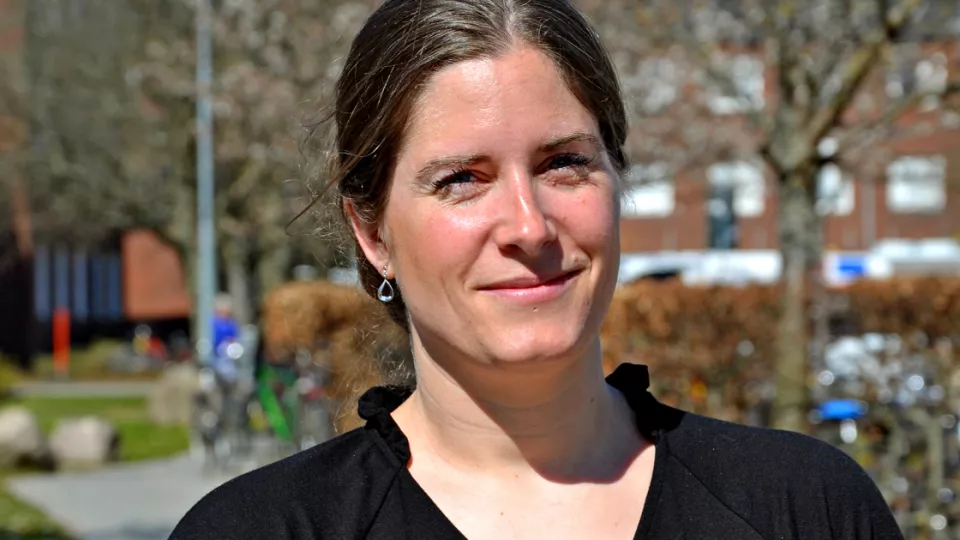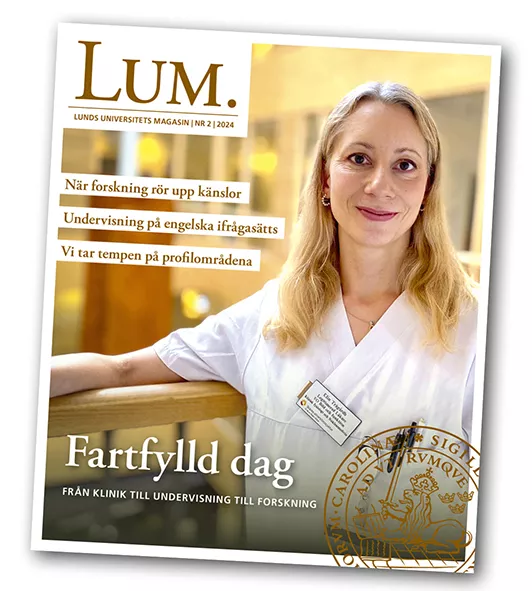At the University, teaching staff and researchers have long been able to choose to work from home when that was most effective for them and for the organisation. Administrators have worked on site and according to set hours. But the Covid-19 pandemic suddenly and firmly introduced the future’s increasingly digital workplace – with no subsequent crash. Lhinn Holmbergh heads the office of the Department of Laboratory Medicine whose staff have largely worked from home during the entire pandemic.
“We have not fallen behind, as our staff have continued to deliver – although we miss each other as people and want to meet in the office. I am impressed with the transition”, she says.
Discussing a 50/50 solution with her staff
Now she is discussing a 50/50 solution with her staff. Those who wish to continue working from home can do so for half the week, but everyone is to be in the office on a particular day, when the staff meeting and coffee break are scheduled.
“But of course this is contingent on the issue of new central guidelines allowing some work from home”, says Holmbergh.
Some people thrive best in the office and want to continue working on site full-time. Holmbergh sees two main advantages in enabling those who want to work from home to do so for half the week.
“Some staff members need the isolation and extra focus that home can provide. Others experience less stress as they manage their work-life balance better”, says Holmbergh.
Central guidelines are needed
How TA staff are to work after the pandemic is under discussion in various forums among heads of office, heads of division and the University management. Line managers are currently not permitted to authorise a certain degree of remote working for technical and administrative staff. This type of decision is taken at a higher level, by the dean or the University director. But the rules may change once the University management has determined how they want to address the issue.
“There are many issues under discussion at the moment and this is one of them. The University management has started working on these issues, but it is too soon to communicate any concrete decisions”, says Jimmie Kristensson, pro vice-chancellor in charge of the work environment.
Not possible to plan for two scenarios for students
The heads of department and teaching staff are in a difficult position. It is too labour-intensive to plan to be prepared for both scenarios in time for the start of the autumn semester. And there are no guarantees that the restrictions will have been lifted by then. If, for example, students are required to maintain a distance of two metres between them it will become practically impossible to set a timetable. This is why many teaching staff members have been asked to plan for remote teaching at least for September and October.
Other higher education institutions, including Malmö University, have already decided that teaching will mainly remain online during the autumn. But in Lund the vice-chancellor has aired the possibility of a return to campus during the autumn, for both students and staff. Naturally this will require restrictions to be lifted, but if the majority of the adult population is vaccinated by September as promised, it is most likely that infection rates will be under control by then. The hope for a brighter future with students and colleagues meeting on campus is alive and well.
A university-wide project on the “Future Workplace” has just been launched under the leadership of Cecilia Billgren. Three workshops have been held with representatives from the whole University, but it is not yet clear which areas the work is to focus on, and LUM will therefore return to this question during the autumn.
The doctoral student: “Study delays are stressful”
Mia Maurer is a doctoral student and two of three studies for her doctoral thesis have been delayed due to the
pandemic. Many doctoral students are in a similar situation and do not know whether they will be granted extra time to complete their theses.
What have the restrictions meant for you?
During my first year, I planned a course in mental training for upper secondary school pupils, which was to form the basis of my first study. But then the pupils were sent home and I could neither implement nor evaluate my course. At the time my thesis focused on applied research, but I had to redirect my efforts and concentrate more on the theoretical framework. My second study is more longitudinal and deals with how the mental health of children and adolescents is affected during upper secondary schooling. The schools had no time or energy during the pandemic to contribute to data collection for this study either, and this risks compromising the quality of my thesis.
What is it like not knowing whether you will be granted an extension?
It is very stressful not to be told until the very end of your period of research studies. This does not affect only me, I know many doctoral students who are living with this uncertainty. I am doing everything I can to adjust my research and complete my thesis in time, because I cannot be sure that I will be granted an extension.
What does the autumn look like for you?
I hope that I can run my mental training course for 16 year-olds in an upper secondary school. In that case, I will make progress in my research and can work on it. But if it doesn't work out, I will have to take a lot of courses and focus on publishing articles about material I collected earlier.
The web editor: “Hybrid meetings should be prohibited”
Yens Wahlgren is a web editor at LTH. He stayed on in the office for a long time, but has now been alternating for
months between a kitchen chair and his sofa.
Where will you be working in the autumn, at home or in the office?
That still remains to be determined, but I would personally prefer to go in to work. Our head of office has gathered opinions from all divisions and there seems to be a consensus that flexibility is a good thing – while most of the job should be done on site.
What do you think did not work well during the pandemic?
Hybrid meetings where some participants are on site and some take part via computer. They are often so embarrassingly bad and boring that they should be prohibited … I hope that meetings will be held either digitally or physically.
In what way do you think the workplace will change?
I don't think that people will show up snivelling at work and say "it's only the 'flu"; instead they will stay home and work from there, if they are healthy enough to work. That is a good thing, but I hope it won't mean that we will be expected to work even when we are ill.
Do you think the University should reduce the number of fixed workplaces if people work from home more?
No, I think that would have a catastrophic impact on the work environment. Look at Niagara at Malmö University, where
many people stopped coming to work even before the pandemic. They couldn't stand working in a huge open-plan office where many people were forced to search both for a workstation and for their colleagues every day.
The lecturer: "Digital teaching is a substitute”
Bo Isenberg is an associate professor of sociology with extensive teaching experience. When teaching became
digital, he reworked his courses completely.
Among other things, he recorded 45 lecture videos and divided the students in the introductory course in sociology in
apparently compulsory small groups.
Why were the scheduled small groups a win?
Because everyone took part, it was educationally successful, but above all socially it was enormously valuable. Previously I have not wanted to be so controlling, instead basing my approach on the idea that university studies are based on interest and free will. I have more loosely encouraged the students to meet up, discuss and perhaps share a bottle of wine. But I am still capable of changing my mind – from now on I want to keep the small groups.
How are you planning the autumn?
We have been encouraged to plan for digital teaching during September and October so I am doing that. If we are to be able to change direction and start on campus, we need new decisions very soon. It is a complex process to arrange timetabling and premises booking.
The digital course you created in Canvas – will it be used when students return to campus?
It could be used as a distance learning course, there are surely strong financial incentives to run more such courses. But for me, the summary of this time is that digital teaching works, but it is a substitute. The best and the most enjoyable aspects are lost. For me, as a lecturer, digital teaching takes a lot of energy and doesn't give much back.






